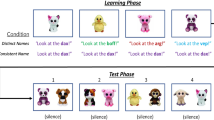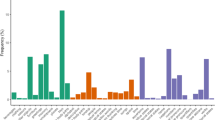Abstract
WHEN an individual gives the name of an object presented to him, he is producing a word in conditions which require the processing of a greater quantity of information than when the same word is evoked in the course of a sentence, where the constraints of grammar, syntax and theme limit the ensemble of possible choices.
This is a preview of subscription content, access via your institution
Access options
Subscribe to this journal
Receive 51 print issues and online access
$199.00 per year
only $3.90 per issue
Buy this article
- Purchase on Springer Link
- Instant access to full article PDF
Prices may be subject to local taxes which are calculated during checkout
Similar content being viewed by others
References
Rochford, G., and Williams, M., J. Neurol. Neurosurg. Psychiat., 25, 222, 228 (1962); 26, 877 (1963).
Thorndike, E. L., and Lorge, I., The Teacher's Word Book of 30,000 Words, (Columbia University, New York, 1944).
Zipf, G. K., The Psycho-Biology of Language, (Houghton Mifflin Co., Boston, 1935).
Author information
Authors and Affiliations
Rights and permissions
About this article
Cite this article
OLDFIELD, R., WINGFIELD, A. The Time it Takes to Name an Object. Nature 202, 1031–1032 (1964). https://doi.org/10.1038/2021031a0
Issue Date:
DOI: https://doi.org/10.1038/2021031a0
This article is cited by
-
Methods for studying the writing time-course
Reading and Writing (2024)
-
Single case studies are a powerful tool for developing, testing and extending theories
Nature Reviews Psychology (2022)
-
Word age-of-acquisition effects: a review
Current Psychological Reviews (1981)
-
Age-at-acquisition and word recognition
Journal of Psycholinguistic Research (1978)
-
Effect of Verbal Context on Latency of Word Selection
Nature (1965)
Comments
By submitting a comment you agree to abide by our Terms and Community Guidelines. If you find something abusive or that does not comply with our terms or guidelines please flag it as inappropriate.



